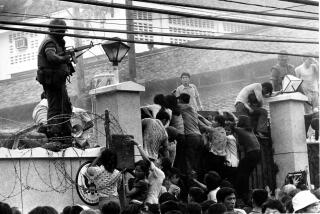Second Opinion / OTHER MEDIA : THE SENTINEL : The Meaning of Kwanzaa
- Share via
It is (Mississippi civil rights leader) Fannie Lou Hamer who taught us that there are two things we should all care about: never to forget where we came from and always praise the bridges that carried us over. In practicing this morality of remembering, we reaffirm our location in the rich, varied and most ancient human tradition, the African tradition. And we give appropriate thanks and honor to those who gave their lives so that we might live fuller and more meaningful ones. But we also learn the lessons and meaning of their lives, identify and absorb a spirit of human possibility and begin to understand and accept the obligations of our history.
For when Mary McLeod Bethune (founder of the National Council of Negro Women) said, “We are heirs and custodians of a great legacy,” she was both calling attention to our ancestors’ legacy and challenging us to honor this great legacy by bearing the burden and glory of our history with strength, dignity and determination. And inherent in this statement and implicit challenge is a call to recognize who we are and act accordingly. In a word, it is a challenge to raise and respond effectively to the question of what it really means to be African.
From a column by Dr. Maulana Karenga in the Sentinel, an African American weekly published Thursdays in Los Angeles. In 1966, Karenga founded Kwanzaa, the seven-day celebration of African culture that ended Jan. 1.
ORANGE COUNTY BUSINESS JOURNAL: Rescuing Orange County
I’ve got how to solve Orange County’s bankruptcy crisis and resolve the El Toro Airport controversy at the same time:
* The Defense Department deeds the Marine base to the county.
* The county issues El Toro land shares to the investors in its failed bond fund, commensurate with their losses.
That’s it, folks. It will be in the interest of the investors to maximize their return on the base, which means everybody will favor its development as an airport--especially the citizens of Irvine, whose city, school district and water agency are staring at a combined loss of more than $160 million as things stand now.
We’d want the county and other governments to do all of this with professional help and plenty of oversight, of course. Maybe the Irvine Co. would be interested in buying the whole shebang for, oh, $2 billion or so.
The Orange County Business Journal is published every Monday in Newport Beach.
RAFU SHIMPO: Smart Is as Smart Does
Are Asian Americans and Asians feeling proud since the recent publication of “The Bell Curve” by Charles Murray and Richard Herrnstein?
The authors believe that intelligence is measurable and heritable, and that one’s genes are more important than one’s environment. They also believe that there is a hierarchy in the intelligence of people from different races. To use the (authors’) outdated descriptions, Negroids statistically score lowest, with Caucasoids next and Mongoloids at the top. After the book came out, I’ll bet there were many Asians smugly thinking, “Yeah, that’s me, Mr. or Ms. IQ. I knew it all along!” Well, not so fast, benjo breath. The jury’s still out.
What is race? One extreme view is that we’re all one race, with chimpanzees as our first cousins. Another extreme is that each of us is a species unto one’s self.
And why are people who are supposed to be so smart spending so much time trying to quantify something as variable a human’s intelligence? Isn’t the focus on one trait--intelligence--overly narrow? There are plenty of other traits, inherited and learned, that are, in my hierarchy of desirable human traits, more important than intelligence: perseverance, kindness, loyalty, altruism, consideration, thoughtfulness, cheerfulness, bravery, wisdom and so on. There have been some very intelligent people who would fail in those categories. So any Asians stupid enough to celebrate their “superior” intelligence merely prove that they aren’t as smart as they think.
From a column by George Johnston in Rafu Shimpo, a Japanese daily newspaper published in Los Angeles.
More to Read
Inside the business of entertainment
The Wide Shot brings you news, analysis and insights on everything from streaming wars to production — and what it all means for the future.
You may occasionally receive promotional content from the Los Angeles Times.










